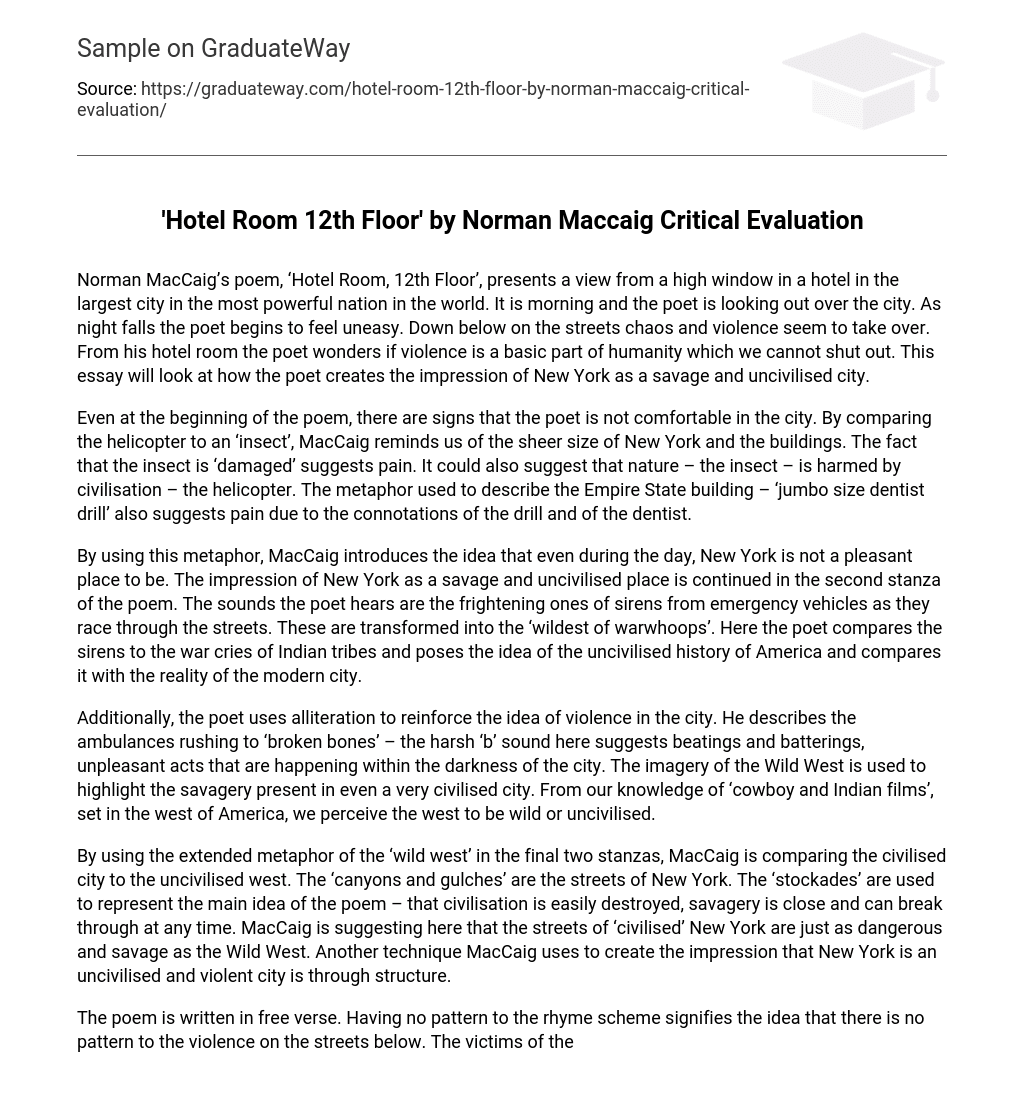Norman MacCaig’s poem, ‘Hotel Room, 12th Floor’, presents a view from a high window in a hotel in the largest city in the most powerful nation in the world. It is morning and the poet is looking out over the city. As night falls the poet begins to feel uneasy. Down below on the streets chaos and violence seem to take over. From his hotel room the poet wonders if violence is a basic part of humanity which we cannot shut out. This essay will look at how the poet creates the impression of New York as a savage and uncivilised city.
Even at the beginning of the poem, there are signs that the poet is not comfortable in the city. By comparing the helicopter to an ‘insect’, MacCaig reminds us of the sheer size of New York and the buildings. The fact that the insect is ‘damaged’ suggests pain. It could also suggest that nature – the insect – is harmed by civilisation – the helicopter. The metaphor used to describe the Empire State building – ‘jumbo size dentist drill’ also suggests pain due to the connotations of the drill and of the dentist.
By using this metaphor, MacCaig introduces the idea that even during the day, New York is not a pleasant place to be. The impression of New York as a savage and uncivilised place is continued in the second stanza of the poem. The sounds the poet hears are the frightening ones of sirens from emergency vehicles as they race through the streets. These are transformed into the ‘wildest of warwhoops’. Here the poet compares the sirens to the war cries of Indian tribes and poses the idea of the uncivilised history of America and compares it with the reality of the modern city.
Additionally, the poet uses alliteration to reinforce the idea of violence in the city. He describes the ambulances rushing to ‘broken bones’ – the harsh ‘b’ sound here suggests beatings and batterings, unpleasant acts that are happening within the darkness of the city. The imagery of the Wild West is used to highlight the savagery present in even a very civilised city. From our knowledge of ‘cowboy and Indian films’, set in the west of America, we perceive the west to be wild or uncivilised.
By using the extended metaphor of the ‘wild west’ in the final two stanzas, MacCaig is comparing the civilised city to the uncivilised west. The ‘canyons and gulches’ are the streets of New York. The ‘stockades’ are used to represent the main idea of the poem – that civilisation is easily destroyed, savagery is close and can break through at any time. MacCaig is suggesting here that the streets of ‘civilised’ New York are just as dangerous and savage as the Wild West. Another technique MacCaig uses to create the impression that New York is an uncivilised and violent city is through structure.
The poem is written in free verse. Having no pattern to the rhyme scheme signifies the idea that there is no pattern to the violence on the streets below. The victims of the violence also remain nameless, menacingly suggesting that it is random and motiveless, thus creating an even more alarming image. MacCaig also often uses the line ending to shock the reader. The lines finish on words like ‘screaming’ and ‘blood’ which helps to suggest images of violence and give the impression of an uncivilised city. The poet also uses enjambment to suggest that this is something which will not change.
He ends one line on the word ‘never’ signifying that there is no end to these acts of savagery, it is part of humanity. To reinforce this idea the poet uses statements, such as ‘The frontier is never somewhere else’. This further demonstrates how certain the poet is that nothing will change. MacCaig uses the personification of midnight to further illustrate the idea of New York as an uncivilised place. ‘Midnight’ comes in ‘from foreign places’, which of course is technically accurate, but MacCaig’s way of expressing this alerts us to the power that midnight has and the darkness it brings seem to possess.
The word ‘foreign’ suggests something alien and sinister and the darkness of midnight is described as ‘uncivilised’. MacCaig’s word choice helps us to understand the idea that city life can be dangerous at night time. The emergency vehicles are racing to ‘the broken bones, the harsh screaming’. Repetition of ‘the’ here suggests how widespread this violence is, how anonymous and impersonal. ‘Coldwater flats’ sounds like the name of some rich and fertile cattle ranch but it is simply the American term for houses without a hot water supply – flats where the poor are likely to be housed.
The violence reaches a peak at the end of the stanza ‘the blood glazed on the sidewalks’. The word ‘glazed’ carries all the force of meaning in these lines. It suggests that a lot of blood has been spilled and lies like pools of glass on the sidewalks, ignored by those who pass it by. MacCaig uses a number of techniques successfully in ‘Hotel Room, 12th Floor’ to create a powerful image of inhumanity beneath the glass buildings which tower above the streets, in one of which the poet lies listening to the horrifying sounds in the darkness.





